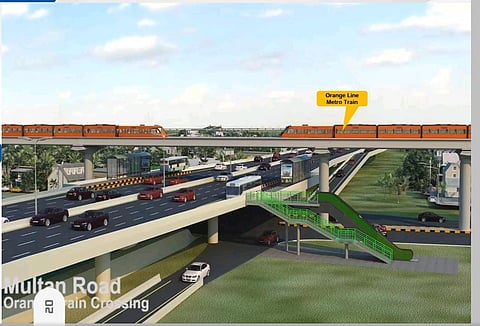Pakistan: Lahore's new elevated highway project, route and benefits
Signal-free corridor to link Gulberg with M-2 Motorway, Metro Bus, Orange Line

Lahore: The Punjab government has given the green light to the long-awaited elevated expressway project in Lahore, reinforcing efforts to transform the provincial capital into a modern urban transport hub.
The 11-kilometre corridor will run from Main Boulevard Gulberg to the M-2 Motorway at Babu Sabu, cutting travel time between the city’s commercial heart and the motorway from 45 minutes to just 10.
Designed as a signal-free route, the elevated expressway will include six major interchanges, with additional links to Lahore’s Metro Bus and Orange Line Metro Train systems.
Benefits
More than 70,000 commuters are expected to benefit daily from the Rs120 billion elevated expressway. The project aims to not only ease bottlenecks but also cut fuel consumption, lower emissions, and reduce overall travel distances by an estimated 82 kilometres.
Lahore Development Authority (LDA) Director General Tahir Farooq described the initiative as a “game changer” for the city’s mobility and economy.
Once complete, the elevated expressway will enhance Lahore’s image as a modern mega-city, with an integrated transport network designed to meet the demands of its growing population of over 12 million. across connected routes.
Existing transport infrastructure
The project is set to complement Lahore’s existing transport infrastructure, which already includes the 27km Metro Bus system, Pakistan’s first mass rapid transit service, and the Orange Line Metro Train, a 27km automated rail system that carries thousands of passengers daily.
The Lahore Ring Road, another vital artery, helps divert intercity traffic around the city and connects with national highways.
By plugging directly into these networks, the new expressway will serve as a high-speed urban corridor, easing congestion on some of Lahore’s busiest roads such as Jail Road, Shama Chowk, Samanabad, Gulshan Ravi, and Bund Road.
Future mega-projects
Officials say the expressway is only one step in Lahore’s evolving transport vision. Plans are under discussion to expand the Metro Bus and Orange Line networks, while feasibility studies have been floated for new metro rail lines connecting underserved parts of the city.
At the national level, Pakistan’s first proposed high-speed “bullet train”, linking Lahore and Karachi, has been touted as a game-changing project that could reduce travel time between the two cities to just five hours.
Sign up for the Daily Briefing
Get the latest news and updates straight to your inbox


